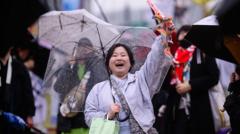South Korea's acting president, Han Duck-soo, has declared that the nation will hold a presidential election on June 3, following the constitutional court's decision to formally impeach Yoon Suk Yeol. Yoon's impeachment, which was ratified on April 4, stemmed from his controversial martial law declaration made in December, a move that plunged the country into significant political turmoil and highlighted substantial societal divisions.
Addressing the nation, Han urged for rapid healing from the political wounds inflicted by the past months, emphasizing the need for the government to move "upward and forward." He expressed his sincere apologies to the public for the confusion and distress experienced during the prolonged presidential vacancy.
Yoon's martial law declaration was originally justified on the basis of perceived threats from "anti-state forces" and North Korea. However, as events unfolded, it became evident that the declaration was largely motivated by Yoon's own escalating domestic political challenges. Alongside his impeachment, Yoon faces separate insurrection charges in court.
As South Korea prepares for the election, several political figures have expressed their intentions to run for the presidential office. Labour Minister Kim Moon-soo resigned from his position to launch his campaign, while Ahn Cheol-soo, a prominent lawmaker from the ruling People Power Party, seeks to capitalize on the electoral opportunity. Leading the current polls is opposition figure Lee Jae-myung, who narrowly lost to Yoon in the 2022 election with a 34% approval rating according to a recent Gallup poll.
Yoon's presidency, characterized by martial law, has garnered significant backlash from segments of the population, leading to widespread protests demanding his ousting, while his supporters have become increasingly vocal and radicalized. In the backdrop of this political crisis, South Korea is also grappling with economic challenges, including the impact of new tariffs on exports to the United States, which are anticipated to reach 25%. Authorities are reportedly seeking negotiations with the Trump administration regarding these tariffs.



















